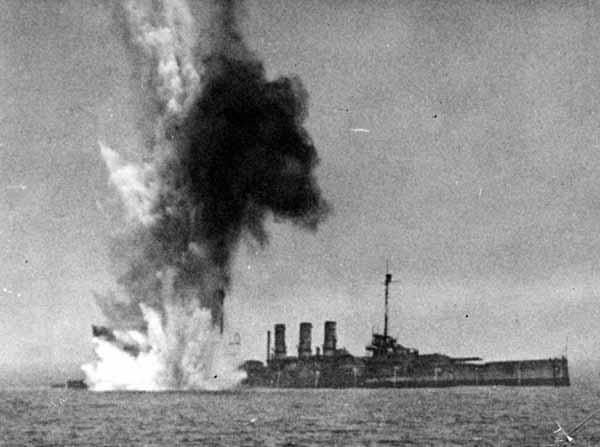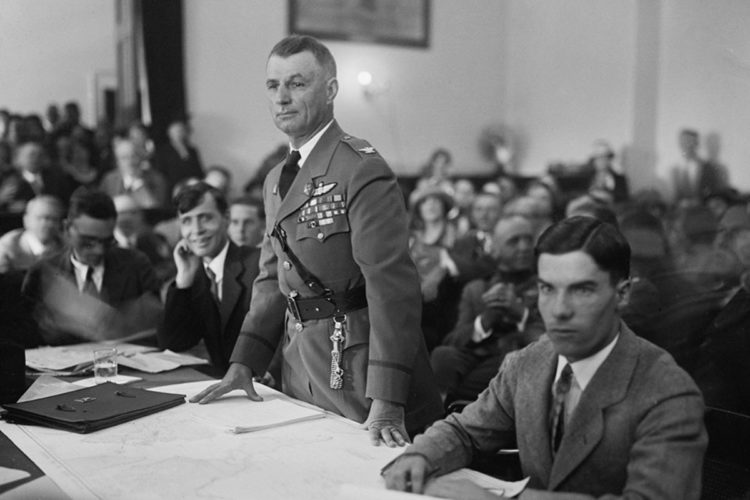Mitchell said that land-based bombers could sink a battleship. He called to task senior Army and Navy leadership over their refusal to see that airpower would be the wave of the future. He advocated the development of bombsights, aerial torpedoes and superchargers for aircraft engines — all of which would more than prove their worth in the next war.
Mitchell’s protests got public support and the Navy eventually agreed to tests to see whether bombers could sink a battleship. Yet, the Navy attempted to rig the tests to disprove Mitchell’s theories.
The Navy chose the target area farther out to sea, in order to minimize the time Mitchell’s bombers would have over the targets. The Navy also stipulated that smaller ships could not be hit with bombs larger than 600 pounds. It also forbid the use of aerial torpedoes and only allowed two hits per target at which time the test would be stopped and a Navy damage control assessment team would assess the damage to each ship.
The targets were to be former German ships taken after WWI. The initial tests were conducted in late June and July of 1921.
Mitchell’s bombers sunk former German destroyer G-102 and the light cruiser Frankfurt.
On July 20, 1921, the former German battleship Ostfriesland was towed to the target area. Army, Navy and Marine Corps bombers hit the battleship with 550- and 600-pound bombs and she began to take on water in her stern. But as Mitchell’s bombers approached the target, they were ordered to halt the attack and were forced to loiter for 45 minutes as heavy seas made it impossible for Navy inspectors to get to the battleship.

The next day, Mitchell’s bombers scored three direct hits on the Ostfriesland, but were again ordered to halt, although they still had nine bombs remaining. At about 12:30 a.m. more bombers hit the battleship, aiming for the water alongside the ship in order to use the concussion to buckle the sides of the vessel. Mitchell’s notes from the attack, as he observed it occurring, were telling.
“Four bombs hit in rapid succession, close alongside the Ostfriesland. We could see her rise eight to ten feet between the terrific blows from underwater. On the fourth shot, Capt Street, sitting in the back seat of my plane stood up and waving both arms shouted, “She is gone!” There were no direct hits but at least three of the bombs landed close enough to rip hull plates as well as cause the ship to roll over. The ship sank at 12:40 pm, 22 minutes after the first bomb, with a seventh bomb dropped by a Handley Page bomber on the foam rising up from the sinking ship.”
The Navy claimed that damage control parties could have stemmed the flooding that sunk the ship, but Mitchell was unperturbed. His report and glowing recommendations of the power of the aircraft would cause the budgets of both the Army and Navy to take notice.
“…sea craft of all kinds, up to and including the most modern battleships, can be destroyed easily by bombs dropped from aircraft, and further, that the most effective means of destruction are bombs. [They] demonstrated beyond a doubt that, given sufficient bombing planes—in short, an adequate air force—aircraft constitute a positive defense of our country against hostile invasion.”
The Navy and President Harding were not happy with Mitchell’s report or the results of the tests and tried to bury the reports…(sounds strangely familiar). Mitchell was sent on tours of far-flung places to keep him away from Washington. But he continued to investigate further developments of airpower and in 1924 published a book called “Winged Defense,” where he once again stated that the U.S and Japan would go to war and that the latter would hit Pearl Harbor in an air raid. The book didn’t sell well and few people read it.
Mitchell was shipped off to San Antonio and a land-based assignment; but if the Army and Navy were hoping he’d be quiet, they were wrong. After a series of serious air crashes, Mitchell blasted both the military and government officials, accusing senior leaders in the Army and Navy of incompetence and “almost treasonable administration of the national defense.”
This was the tipping point: In October 1925, President Calvin Coolidge ordered that he be court-martialled, accusing him of violation of the 96th Article of War: bringing discredit to the armed forces. The court-martial began in early November and lasted for seven weeks.
The court-martial didn’t bother itself on whether Mitchell’s observations were true or false. The result was foregone, and on December 17, 1925, the court found him “guilty of all specifications and of the charge.” The court specified that it was “lenient” to Mitchell, due to his outstanding service in the war. Mitchell was then suspended from active duty without pay for a period of five years. However, President Coolidge later amended this punishment to half-pay.
Mitchell then promptly resigned from the Army on February 1, 1926. He tried to sell Roosevelt, his former antagonist, on a unified Department of Defense idea and would spend the rest of his life extolling the virtues of airpower.
Mitchell died of heart disease, brought about by and extreme case of influenza, in New York City on February 19, 1936, at the age of 56. He was buried at Forest Home Cemetery in Milwaukee, Wisconsin.
The vast majority of his theories on the development of air power and on Japan’s actions would prove to be correct. However, he thought that land-based bombers, and not bombers launched from aircraft carriers, would be the game-changers, as he believed that ships couldn’t be big enough to carry enough aircraft to do the job.
He was posthumously awarded the Congressional Gold Medal.










COMMENTS